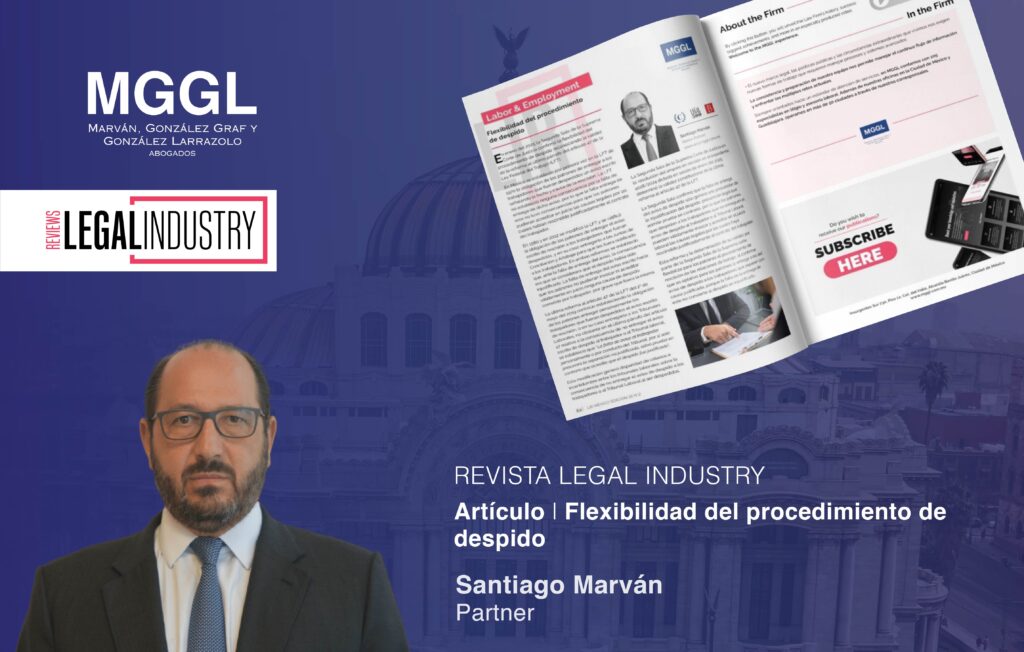On November 12th, 2020, the Executive Branch proposed to the Legislative Chamber an amendment initiative to the Federal Labor Law (“FLL”), the Social Security Law, the Institute of the National Fund for Workers’ Housing Law (“INFONAVIT Law”), the Federal Tax Code, the Income Tax Law and the Added Value Tax Law, with regard to subcontracting and more generally, outsourcing. This amendment initiative pretends to prevent companies from subcontracting services inherent to their corporate purpose, by engaging third party services providers for the allocation of personnel and, only if applicable, enter into specialized service agreements. The aim is for companies to directly hire the personnel involved in the exploitation and production of the goods and services they offer to their respective markets.
The initiative, in line with the initiative submitted on October 2019 by senator Napoleón Gómez Urrutia, is aimed to be justified under the argument that the transfer of employees in the subcontracting scheme (i) harms and impedes employees from accessing adequate levels of welfare, (ii) promotes the omission of payment of profit sharing, (iii) allows for employers to hire personnel under inferior conditions and breach employers’ labor tax and social security obligations regarding the outsourced employees, (iv) promotes the simulation of operations, through the issuance of invoices with virtual operations, thus affecting the tax administration, and (v) affects the right to “organize and collective bargaining”.
Nevertheless, the scope of this initiative submitted to the Joint Commissions of Work and Social Welfare, and the Finance and Public Credit for the opinion of Social Security and Housing is significantly more ambitious. Even when in the explanatory statements the Executive justifies the necessity to prohibit subcontracting schemes, the proposed amendments leave a minimum margin to subcontract services.
Indeed, the amendment initiative pretends to eliminate the possibility to subcontract services under the scheme of independent services, in which one company with its own resources renders services to another company, under an independent scheme, without administration or control of the beneficiary, pursuant to certain standards of service.
The initiative expressly prohibits subcontracting and derogates articles 15-A. to 15-D.- of the FLL. In the proposed legal framework, subcontracting is defined as the scheme in which a person or legal entity allocates its employees for the benefit of another party.
Furthermore, it stipulates specific regulations for the engagement of services with third parties, under a regime that is exception to the rule.
The provision of services under the regime of “specialized services agreement or for the execution of specialized works” will not be considered as subcontracting and will only be enforceable provided that (i) the services hired are specialized and will not constitute part of the corporate purpose or the economic activity of the beneficiary; (ii) the contractor has the authorization of the Ministry of Work and Social Welfare (for its initials in Spanish, “STPS”) as provider of specialized services (this authorization is obtained and endorsed after three years, and the provider needs be up to date in its labor, tax and social security obligations); and (iii) the services need to be hired in writing, describing the services to be provided and the number of employees involved.
In order to avoid the simulation of employers’ substitutions, the amendment pretends to establish as requirement for validity the transfer of goods between the former (substituted) and the new (substitute) employer. From our point of view, this clarification is adequate, since it includes several criteria issued by the Federal Department of Justice, in addition to the fact that, in the past, various employer substitutions were implemented without complying with the necessary legal requirements for them to be valid.
Pursuant to LFT if amended in terms of the initiative, if the contractor does not comply with the employer obligations, the beneficiary of the services would be jointly responsible for them. Furthermore, in case of blocking a work inspection, employers will be required by means of a notice to submit certain documents and, in case of non-compliance, it will be deemed that they did not have the required information, this being subject to a fine between 250 and 5000 times the Actualization Measure Unit (“UMA” by its acronym in Spanish). It should be noted that the potential sanction is up between 2,000 and 50,000 times the UMA for those that subcontract personnel.
Similarly, the initiative amends the Social Security Law and the INFONAVIT Law to implement the regime of “specialized services agreement or for the execution of specialized works”. The amendment establishes (i) jointly liabilities for the services beneficiary; and (ii) a general obligation to register and inform the agreements executed under such regime.
In order to deter third party subcontracting services, the initiative also proposes amendments to the Federal Tax Code, the Income Tax Law and the Added Value Tax Law. The stated amendments condition the deductibility and accreditation of the expenses of the company when (i) it is regarding subcontracting agreements; (ii) the employees assigned to the beneficiary by the contractor were employees of the beneficiary and were transferred to the provider of services; and (iii) the assigned employees cover all of the predominant activities of the contracting party.
In order to have the possibility to deduct and credit the expenses and VAT inherent to the subcontracting of services, it will be necessary that the contracting party obtains from the contractor (i) copy of the issued authorization of the STPS, (ii) tax receipts of the salaries of the assigned personnel; (iii) statement of the withheld taxes and payments of employer-worker fees; and (iv) receipt of the payment of the corresponding relocated VAT.
We place special emphasis on this initiative submitted by the Executive because it reflects the objectives originally set out in its labor policy, but there are eight (8) other proposed amendment, which have been submitted since October 2018 to the date and should be analyzed in the same way.
In our opinion, this initiative will be subject to great discussion particularly in the Senate of the Republic, where the Executive has less room for maneuver and political control.




